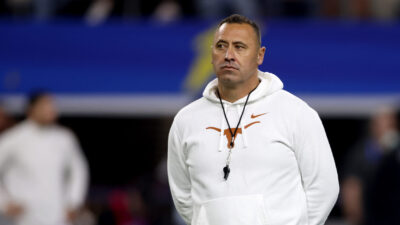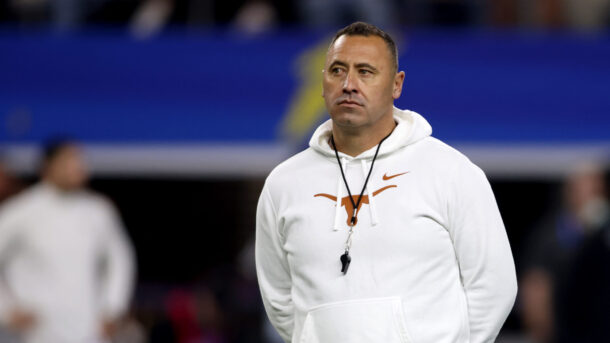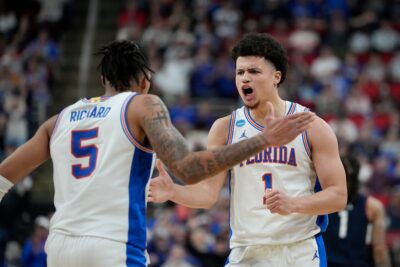Ad Disclosure
Duke is by far the most polarizing program in college basketball. You either love the Blue Devils or you despise them. There is rarely any in-between.
Some of that passion is related to the personalities who have become the faces of Duke’s program over the years. Especially Hall of Fame coach Mike Krzyzewski, whose intensity, toughness and swagger – or cockiness, depending on your point of view – carried over to the players he recruited.
Christian Laettner. Bobby Hurley. Shane Battier. Jason Williams. JJ Redick. Zion Williamson.
They’re some of the best ever to play the college game. Along with numerous other All-Americans and NBA Draft picks, they’ve built a legacy that has kept the Blue Devils at or near the top of the ACC standings and national polls virtually every year since the mid-1980s.
Duke’s dominance has continued since the transition from Coach K, who retired in 2022 as the winningest coach in college basketball history, to his former national champion point guard and current coach Jon Scheyer. And it remains the team you either love or love to hate.
Let’s take a deeper look into the Blue Devils’ storied history.
How Many Times Has Duke Won The NCAA Tournament?
Entering the 2024-25 season, Duke won the NCAA Tournament 5 times: 1991, 1992, 2001, 2010 and 2015.
How Many Times Has Duke Been to The Final Four?
The Blue Devils have advanced to the Final Four 18 times under 4 coaches: Vic Bubas (1963, 1964, 1966), Bill Foster (1978) and Mike Krzyzewski (1986, 1988, 1989, 1990, 1991, 1992, 1994, 1999 2001, 2004, 2010, 2015 and 2022) and Jon Scheyer (2025).
How Many Times Has Duke Won The ACC Tournament?
The Blue Devils defeated Louisville 73-62 on March 15, 2025 to win their 23rd ACC Tournament championship, the most in conference history. Their other titles came in 1960, 1963, 1964, 1966, 1978, 1980, 1986, 1988, 1992, 1999, 2000, 2001, 2002, 2003, 2005, 2006, 2009, 2010, 2011, 2017, 2019 and 2023.
Duke’s National Championship Teams
Here’s a brief look at the Blue Devils’ 5 NCAA Tournament championship teams and how they conquered March Madness.
2015: 34-5, NCAA champion
2015 NCAA Tournament path: Duke was the No. 1 seed in the South Region.
- Round 1: defeated No. 16 seed Robert Morris 85-56
- Round 2: defeated No. 8 seed San Diego State 68-49
- Sweet 16: defeated No. 5 seed Utah 63-57
- Elite Eight: defeated No. 2 seed Gonzaga 66-52
- Final Four: defeated No. 23 seed Michigan State 81-61
- Championship: defeated No. 3 seed Wisconsin 68-63
Season in review: The 2014-15 season began with heightened expectations, even by Duke standards, with the arrival of heralded freshmen Jahlil Okafor, Justise Winslow, Tyus Jones and Grayson Allen. Together, they bonded with holdovers Quinn Cook and Amile Jefferson to form a team that lived up to the hype. But not without a few bumps along the way. Questions were raised about the Blue Devils’ toughness and depth in mid-January after back-to-back double-digit losses to NC State and Miami, and the dismissal of reserve guard Rasheed Sulaimon. But the team eventually jelled and ran off 11 straight wins to close out the regular season. The momentum continued to build into the NCAA Tournament and an anticipated showdown against unbeaten and top-ranked Kentucky. But when the Wildcats were upset in the national semifinal, Duke faced Wisconsin in the championship game. While Okafor was the ACC’s Player of the Year and the national Freshman of the Year, it was gritty point guard Jones who hit the clinching 3-pointer and was named NCAA Tournament Most Outstanding Player in the Blue Devils’ title-clinching 68-63 victory at Lucas Oil Stadium in Indianapolis.
2010: 35-5, ACC regular-season champion, ACC Tournament champion, NCAA champion
2010 NCAA Tournament path: Duke was the No. 1 seed in the South Region.
- First round: defeated No. 16 seed Arkansas-Pine Bluff 73-44
- Second round: defeated No. 8 seed California 68-53
- Sweet 16: defeated No. 4 seed Purdue 70-57
- Elite Eight: defeated No. 3 seed Baylor 78-71
- Final Four: defeated No. 6 West Virginia 78-57
- Championship: defeated No. 8 Butler 61-59
Season in review: This wasn’t the most talented of Duke’s 5 national championship teams. But it might have been its most together. It was an old-school unit built around a veteran core of seniors Jon Scheyer, Lance Thomas, Brian Zoubek and juniors Kyle Singler and Nolan Smith, who between them played 638 games together. It was a team Krzyzewski publicly referred to as “good, not great.” But it grew as the season progressed, especially after Scheyer took over as the primary ball handler and the 7-1 Zoubek blossomed after being inserted into the starting lineup. By the time they reached Indianapolis for the Final Four, they were the only No.1 seed left standing. After disposing of West Virginia in the semifinal, they faced underdog Butler – a true-life version of the Hickory Huskers from the movie Hoosiers, playing only a few miles from their campus. This time, the big guy spoiled the Cinderella story. But not until Gordon Hayward provided a scare by barely rimming out a potential game-winning halfcourt shot at the buzzer. Afterward, Krzyzewski ungraded his team from just “good” by telling them they’d become “a great team.”
2001: 35-4, ACC regular-season co-champion, ACC Tournament champion, NCAA champion
2001 NCAA Tournament path: Duke was the No. 1 seed in the East Region.
- First round: defeated No. 16 seed Monmouth 95-52
- Second round: defeated No. 9 seed Missouri 94-81
- Sweet 16: defeated No. 4 seed UCLA 76-63
- Elite Eight: defeated No. 6 seed Southern Cal 79-69
- Final Four: defeated No. 11 Maryland 95-85
- Championship: defeated No. 5 Arizona 82-72
Season in review: North Carolina is Duke’s most intense traditional rival. But no one tested the Blue Devils more on the way to the 2001 national title than Maryland. The teams played 4 times, splitting their regular season meetings. Duke erased a 10-point deficit in the final minute of regulation to win in overtime in College Park while the Terrapins spoiled Duke’s Senior Night at Cameron. They met again in the ACC Tournament semifinals, with the Blue Devils winning at the buzzer on a Nate James tip-in before finally deciding the issue in Minneapolis at the Final Four. There, national Player of the Year Shane Battier led Duke back from an early 22-point deficit to claim the series. Two nights later, Battier, Jason Williams, Mike Dunleavy Jr. and Carlos Boozer shot down Arizona to give Krzyzewski his third national championship, tying him with his old coach Bobby Knight for third on the all-time list behind Adolph Rupp (4) and John Wooden (10).
1992: 34-2, ACC regular-season champion, ACC Tournament champion, NCAA champion
1992 NCAA Tournament path: Duke was the No. 1 seed in the East Region.
- First round: defeated No. 16 seed Campbell 82-56
- Second round: defeated No. 9 seed Iowa 75-62
- Sweet 16: defeated No. 4 seed Seton Hall 81-69
- Elite Eight: defeated No. 2 seed Kentucky 104-103 OT
- Final Four: defeated No. 5 Indiana 81-78
- Championship: defeated No. 15 Michigan 71-51
Season in review: Led by All-American Christian Laettner, record-setting point guard Bobby Hurley and the multi-talented Grant Hill, the Blue Devils were the best team in the country from start to finish on the way to becoming the first repeat national champion since UCLA won 7 straight titles from 1967-73. And the last to do it for another 15 years. Their only losses came by 2 points to rival North Carolina in early February and by 4 at Wake Forest 3 weeks later. And yet despite that dominance, Duke almost didn’t make it out of the regionals. It took an overtime struggle and a perfect game from Lattner, capped by one of the most iconic buzzer-beaters in NCAA Tournament history, to survive a challenge from Kentucky and advance to the Final Four. They had a much easier time against Michigan and its brash Fab Five, handling the Wolverines a 71-51 beatdown in Minneapolis to cut down the nets for the second year in a row.
1991: 32-7, ACC regular-season champion, NCAA champion
1991 NCAA Tournament path: Duke was the No. 2 seed in the Midwest Region.
- First round: defeated No. 15 seed Northeast Louisiana 102-73
- Second round: defeated No. 7 seed Iowa 85-70
- Sweet 16: defeated No. 4 seed UConn 81-67
- Elite Eight: defeated No. 2 seed St. John’s 78-61
- Final Four: defeated No. 1 UNLV 79-77
- Championship: defeated No. 12 Kansas 72-65
Season in review: One year after suffering the worst championship game loss in NCAA Tournament history, a 30-point embarrassment at the hands of UNLV, the Blue Devils avenged that defeat by pulling off one of the biggest upsets in Tournament history. With Hurley hitting a key 3-pointer and Laettner making the go-ahead free throws with 12 seconds remaining, Duke snapped the Rebels’ 45-game winning streak to take down the defending champions in the Final Four. The Blue Devils then beat Kansas, coached by future North Carolina rival Roy Williams, in the final to win their first title after 4 straight championship game losses. Duke put itself in the position to cut down the nets by going a perfect 16-0 at home and winning the ACC’s regular-season title with an 11-3 mark.
Duke’s Hall of Fame Coaches
Vic Bubas
Record at Duke: 213-67
Overall record: 213-67
NCAA Tournament titles: 0
Notable: After honing his skills as both a player and assistant coach under the legendary Everett Case at NC State, Bubas was hired by Duke to transform the Blue Devils from a regional program into a national power like the Wolfpack and their other neighboring rival, North Carolina. Although he never won an NCAA Tournament title, Bubas got Duke to 3 Final Fours and helped lay the foundation upon which successors Bill Foster and Mike Krzyzewski continued to build. He was a master recruiter and innovator who retired in 1969 despite being only 42 years old. His .761 winning percentage still ranks as the 10th-best in college basketball history.
Mike Krzyzewski
Record at Duke: 1,129-309
Overall record: 1,202-368
NCAA Tournament titles: 5
Notable: Coach K was a little-known former Army captain with a name more difficult to pronounce than spell when he came to Duke in 1980. He played point guard for Bob Knight at Army. But athletic director Tom Butters thought so much of him that he stuck with the young coach through some early struggles. Krzyzewski eventually repaid Butters’ faith by going on to become the one of the most respected and successful coaches in college basketball history. In addition to his record 1,202 victories, Krzyzewski hung 5 national championship banners, more than anyone other than UCLA’s John Wooden, made 13 trips to the Final Four, won 15 ACC Tournament titles while also leading the United States to 3 Olympic gold medals.
Duke’s All-Time Starting Five
Nothing stirs more debate among Blue Devils fans, especially when you mix generations, than trying to determine an all-time starting lineup. But here goes.
Point guard: Bobby Hurley
Hurley was a brash kid from Jersey who embodied the toughness and cockiness of the Blue Devils’ back-to-back national champions in 1991-92. He helped Duke to 3 straight Final Four appearances, winning Most Outstanding Player honors in 1992, and was selected as one of the 50 greatest players in ACC history upon the league’s 50th anniversary in 2002. Hurley’s 1,076 career assists are still the most in NCAA history, He also scored 1,731 points and amassed 202 steals in his 4 seasons. His No. 11 was retired by Duke in 1993.
Shooting guard: JJ Redick
One of the most prolific scorers in NCAA history, Redick’s 2,769 points were the most in ACC history at the time of his graduation in 2006. He still ranks second on the all-time list behind North Carolina’s Tyler Hansbrough. He also set records with 457 career 3-pointers and a free throw percentage of .912. The 6-4 sharpshooter still holds the mark for most points scored in the ACC Tournament, with 225. Redick’s shooting prowess made him a 2-time Associated Press Player of the Year and the 2006 Wooden Award winner. But it also helped make him the Dukie everyone loved to hate. And he played the role of villain to the hilt, especially with it came with his high-profile battles with rivals North Carolina, Maryland and their fans.
Small forward: Shane Battier
This was a tough one. Grant Hill, Jayson Tatum and others in the conversation. But Battier was the quintessential Duke player of the Krzyzewski era. Sleek yet tough, cerebral, versatile and a game-changing force on both ends of the court, he was the leader of on two Final Four teams, leading the Blue Devils to a national title and and earning Most Outstanding Player honors as a senior in 2001. Battier finished his career with 1,984 points, 887 rebounds, 239 assists, 266 steals and 254 blocked shots. In addition to being a 2-time consensus All-American and winning the Naismith Award winner as the national Player of the Year that season, he was also an Academic All-American and a 3-time national Defensive Player of the Year.
Power forward: Christian Laettner
With 2,460 points, 1,149 rebounds, 273 assists, 243 steals, 4 Final Four appearances, 2 national championships and a Wooden Award to his credit, along with one of the most iconic game-winning buzzer-beaters in NCAA Tournament history, an argument can be made that Laettner is the best player ever in the ACC. He still holds NCAA Tournament records for points scored (407), free throws made (142) and games won (21). In addition to his talent and flair for the dramatic, Laettner was also the most competitive player on the court with a mean streak best illustrated by his infamous foot stomp to the chest of Kentucky’s Aminu Timberlake shortly before beating Kentucky in Duke’s classic 1992 NCAA Regional final victory.
Center: Elton Brand
Krzyzewski’s teams were famous for their positionless big men who could play both inside and out. But Brand was the exception. A dominant low-post presence at 6-9, 254 pounds. Strong, yet blessed with the agility and a soft shooting touch of a smaller man, Brand was the centerpiece of perhaps the best team never to win an NCAA championship, Duke’s 1999 team that went 37-1 before losing to UConn in the national title game. He won the Wooden and Naismith awards as the national Player of the Year as a sophomore before joining teammates Will Avery and Corey Maggette as the first 3 Blue Devils to leave for the NBA Draft with eligibility remaining.
Award-winning columnist Brett Friedlander has covered the ACC and college basketball since the 1980s.



